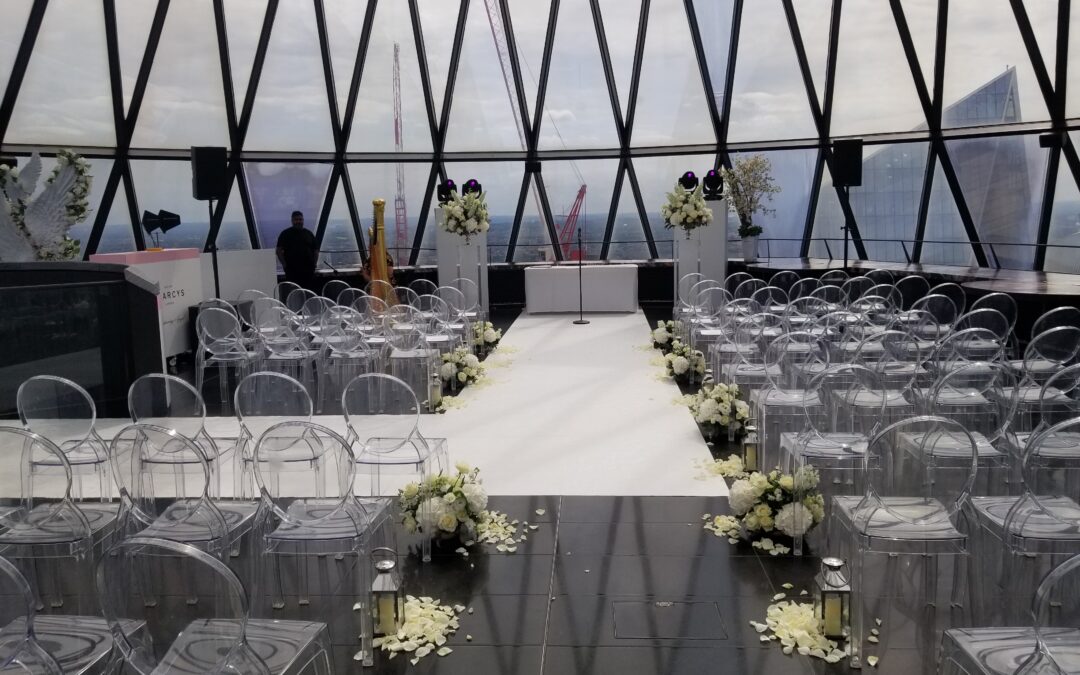
by Michael | Aug 23, 2022 | Blog
This may seem like an odd question! But you may need help deciding when to marry. By that I mean the most advantageous time, day and type of ceremony for you. (Not after downing half a dozen cocktails!)
The Ceremony
Proposals for new wedding legislation are going through parliament (slowly!) as I write. But we’re a few months away from any declaration and then the legal process won’t be that quick. So what follows is still up-to-date advice.
Register Office
Waters are slightly muddied these days, as Register Offices tend to be understaffed since COVID.
In principle, you can make an appointment, and go down there on the appointed day with two witnesses and have a 10-15 minute non-religious ceremony. That’s it.
Some registrars will come out to a licensed venue (at a significant cost) and conduct the wedding there, but this is not so easy to arrange nowadays, especially bearing in mind the staff shortages I referred to.
Alternative Ceremonies
Religious
Basically, nothing has changed regarding conventional church weddings, and that alternative is self-contained and standardised. You arrange this through your priest.
Part- or non-religious
For a unique, tailor-made service, you have a third alternative, which is where I could come in. A celebrant-led ceremony could contain as much – or as little – religion as you want, and also include rituals of your choosing. The whole service can be arranged according to your vision – even the venue. Your celebrant will be delighted to advise and guide you. Your ceremony can be as personalised as you wish.
When to Marry
As you might expect, peak periods (like July and August) tend to be more expensive. Weekends usually cost more, as do high season dates. Bank holidays and celebrations such as Valentine’s Day are likely to come out more expensive, and evenings can cost more than mornings/afternoons.
Whatever your choice, you will probably need to book well in advance, and give your guests plenty of notice. Especially if you’re opting for a destination wedding.
Discounts
It doesn’t normally hurt to ask suppliers if they’ll offer any reductions, especially if your event is out of season. They can only say no!
Conclusion
There’s plenty to think about, then, but I hope that these remarks shed some useful light, at least. You may need to be flexible and should certainly do some research, but the results can be so worthwhile.
Never forget that it is your big day, and you deserve to get it right.
Do speak to me. I’d love to help you further.
by Michael | Dec 13, 2016 | Blog
So you’ve got engaged – congratulations! But don’t sit back! It’s time to start the wedding count down.
There’s more to do than you’ll expect. To keep it as stress-free as possible, I recommend that you start planning at least a year before the event.
If you put things off, you’ll soon find that you’re under pressure – and possibly making the wrong decisions.
Don’t be impulsive, although you should go with your heart to quite a degree. Wherever possible, follow recommendations. Visit suppliers and certainly the venue, so you can get a feel for them. Take the opportunity to ask questions.
Here are some of the things to do:
As early as possible
- Fix your budget
- Decide on the type of ceremony you want (full religious; totally secular (Register Office); mainly religious, non-religious or part-religious (Civil Celebrant))
- Book your venue
- Book your florist, cakemaker, transport, caterers, musicians, entertainers, photographer/videographer
- Book your minister, registrar and, of course, civil celebrant.
- Draft a guest list
- Choose your team (bridesmaids, ushers and Best Man)
- Start looking for your wedding dress
- Organise wedding insurance
Six months before
- Buy your wedding rings
- Buy your bridal lingerie and shoes (and wear them for dress fittings)
- Book a hairdresser and make-up artist
- Choose outfits for the groom, best man and ushers
- Order your stationery
- Book your honeymoon – check passports are valid. Do you need any vaccinations?
Three months before
- Confirm ceremony details (including [celebrant] order of service and wedding music )
- Send out invitations and gift list
- Discuss menu and drinks with caterer
- Have initial dress fitting
- Buy gifts for Best Man, ushers and bridesmaids
- Plan your hen/stag parties
My next blog will take you through the month before your wedding, so don’t miss it! However, if you can’t wait, why not e-mail me and I’ll gladly send you my Wedding Countdown Checklist, which will tell you everything in one document?
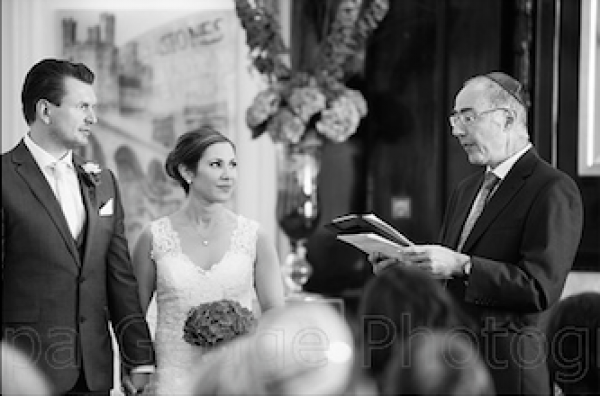
by Michael | Nov 30, 2015 | Blog
Mixed marriage is very common these days.
Not everybody can – or wants to – marry in a religious institution. Catholics will not allow divorcees to marry in church; same-sex ceremonies are not permissible in many churches; Christians and Jews, for example, can’t be married in either church or synagogue.
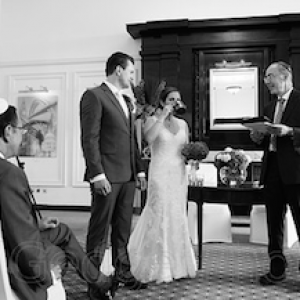 Photos: Philippa Gedge Photography
Photos: Philippa Gedge Photography
Of course, Register Offices offer an alternative (for any marriage, a registrar must always be involved to cover the legal requirements), but their services are standardised and limited (though they will suit some people fine, of course). These services must be totally non-religious. Which means that they often do not meet the needs or wishes of the couple or their families. That’s where the (non-humanist) civil celebrant can come in.
The civil celebrant will work with the couple to design the service that fits in with their beliefs. So it may be religious, part-religious or totally secular. It may contain rituals from a variety of religions and/or cultures.
The service will also be exactly as the couple want. So it is up to them what clothes will – or will not – be worn (I have been asked if I’d do a naturist wedding!). The couple can choose readings or poems, and also readers. There can be an address by the celebrant – checked in advance by the couple. They can have the choreography that they want, including the music. In short, absolutely everything can be approved by the couple before the day.
Logistically, there are a couple of decisions to be made.
- Should the register office ceremony take place a few hours – or a day or two – in advance? That way, the legal bit is covered by the time the couple come to the ‘real’ wedding ceremony, and they can relax and really enjoy their bespoke ceremony.
- Should the civil ceremony or blessing come straight after the legal marriage (at the same venue)? The ring blessing, for example, could be done by the civil celebrant, as could the vows. This way, the registrars could conduct a 10-15 minute ceremony, and the blessing ceremony could take around as long (depending).
The important thing on such a big day is to enjoy a memorable, meaningful ceremony – one which the couple and their guests will remember fondly for months and years to come. By creating a personalised service and conducting it professionally, a good civil celebrant will ensure this.
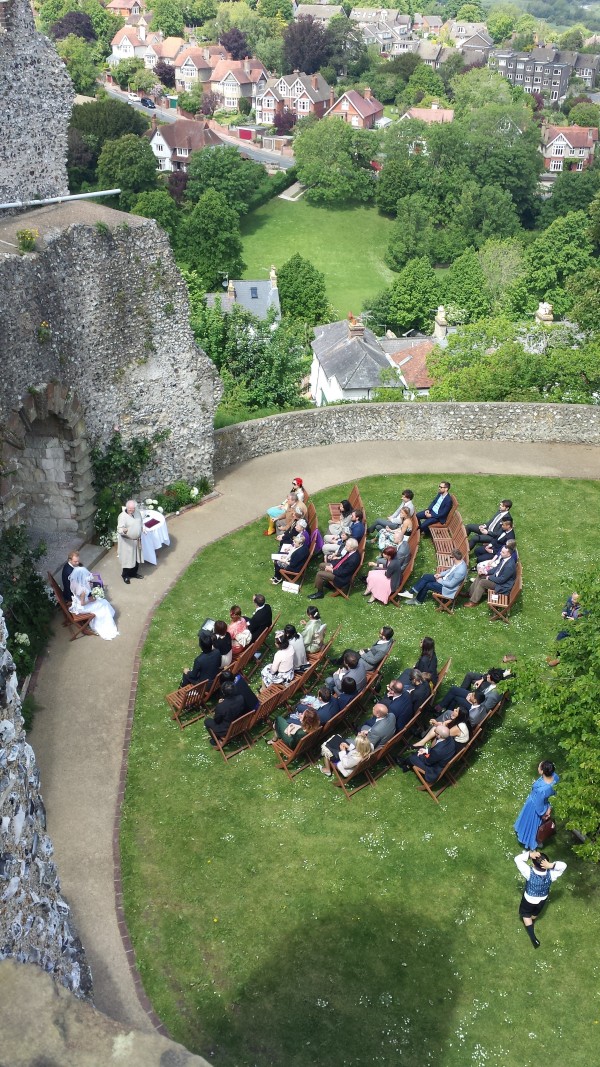
by Michael | May 5, 2015 | Blog
Just how easy is planning a wedding ceremony?
Well, OK, six steps may be over-simplifying it a bit, but the principles I’m about to suggest will be a great starting-point.
Bear in mind that not everybody will want the same thing for their wedding, so these comments may be of varying importance or relevance to people with different budgets, of different religions (or none), or with different ideas of scale, etc.
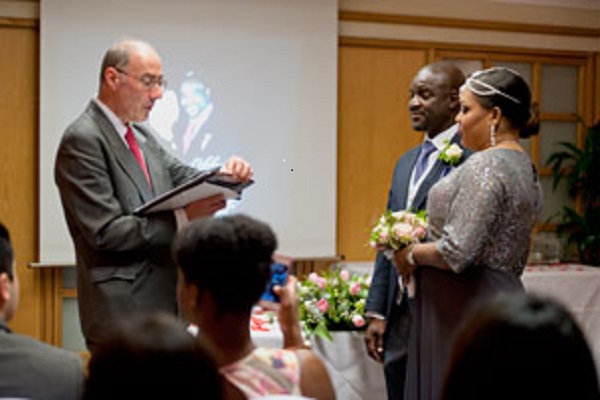
So here goes:
- Whether or not you will marry in (say) church or in a civil ceremony, you will need to give official notice of your intentions. Consult with your priest or local register office to get the legal low-down, but, as with all your preparations, allow plenty of time for this.
- You will need to book your venue well in advance. If you are choosing a civil ceremony, do go and visit the venue, so you can see if it fits in with your dreams.
- The reception may be in a different venue, but, either way, go along and book it earlier rather than later. Start thinking also about who to invite and, eventually, about seating plans, if any.
- Book your civil celebrant well in advance (they get booked up too). Meet them first (or, at least, Skype them), because you’ll want to be sure there’s going to be rapport between you. After all, you’ll have to work quite closely with them. You’ll need to decide on the type and tone of service you’ll be having. (Obviously, there’s much less freedom here if you’re having either a full religious service or else a register office ceremony.) If you’re having a civil ceremony, you’ll want to discuss the content, so that it can be personalised for you. Finally, make sure you are happy with the Ts and Cs before making your final decision (as with all your suppliers). An excellent place to start looking is at www.vowsthatwow.co.uk – well, I would say that!
- Start thinking about the music you want to include. (Again, your celebrant should be able to advise you.) Consider the sound system and also any musicians you may want to use.
- Start booking your other suppliers. These may include florists, a toastmaster, photographers/videographers, cake-makers, caterer, dress or suit supplier, post-ceremony entertainer, hair/beauty treatment, guest accommodation, etc.
If you want a concise, easy-to-follow (and modestly-priced) guide that will take you virtually every inch of the way, then have a look at my recently-published “Your Wedding Guide”.
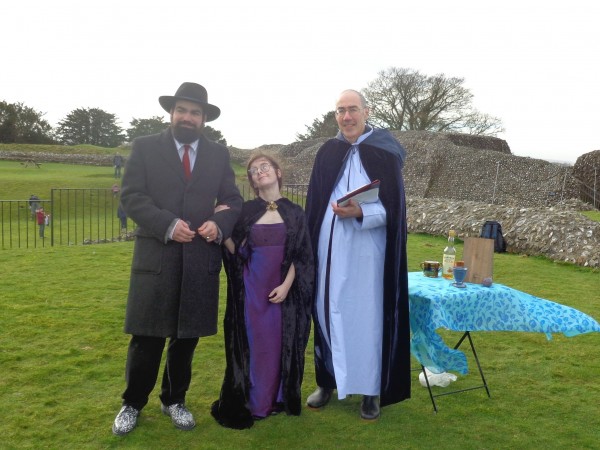
by Michael | Mar 4, 2014 | Blog
Matrimony may have declined somewhat in popularity, but it is still high in people’s consciousness. And there’s little doubt that changes are afoot in the UK wedding industry.
Some developments
Weddings do not have to be held in a religious building or in a registry office (although of course they do have to comply with legislation). You can marry in a hotel or stately home. You can celebrate your wedding on Waterloo Bridge, at Stonehenge, on a mountain top, on the coast, underwater (apparently!) or in a hot air balloon. Indeed, the sky – pardon the pun – is the limit!

You can have a conventional ceremony – or maybe a handfasting at Old Sarum?!
You can have a part-religious ceremony or a pagan handfasting. You can include a combination of rituals. It’s really up to you.
Single-sex weddings will be here by the end of this month, which extends the range of choice still more.
Feminism
Then there are changes brought about by the feminists. The bride doesn’t necessarily wear white. She might not take on the husband’s name. She may refuse to be given away.
The couple may eschew wedding vows and not bother with the honeymoon. Some will have done away with the engagement ring too.
Benefits
Most of these changes, arguably, benefit the woman (especially, dropping the need to promise to “love and obey” the husband). However, they may well have other benefits. Some of these will save the couple money, possibly at a time when expenditure is high (they may be buying a home, for example). More than that, there is something to be said, I think, for couples dropping traditions that actually don’t mean much, or anything, to them. Sincerity counts.
Personalising their wedding, so that it contains just what the couple chooses and matters to them, is sure to be something that they will always gladly remember. And, because it’s sincere and unique, the guests will enthusiastically recall such a ceremony too.
Personally, I like a traditional wedding (indeed, I had one myself), but I also love creating bespoke ceremonies for others, enabling them to make the most important day of their lives memorable, significant and, simply, a delight.
What do you think about these changes?
Michael Gordon can help prepare and conduct a tailor-made life-cycle civil ceremony in or around London or, indeed, in Europe.






